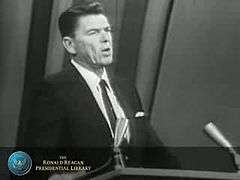A Time for Choosing
 In support of Goldwater, Reagan delivers the address, A Time for Choosing. The speech launches Reagan to national prominence. | |
| Duration | 29:33 |
|---|---|
| Date | October 27, 1964 |
| Location | Los Angeles, CA, United States |
| Also known as | "The Speech" |
| Participants | Ronald Reagan |
| Type | Televised campaign speech |
| Website | Video clip, audio, transcript |
 |
This article is part of a series about Ronald Reagan |
|---|---|
President of the United States First term Second term Post-Presidency | |
A Time for Choosing, also known as The Speech, was a speech presented during the 1964 U.S. presidential election campaign by future president Ronald Reagan on behalf of Republican candidate Barry Goldwater.
Background
Many versions of the speech exist, since it was altered over many weeks. Contrary to popular belief, however, the speech was not given at the 1964 Republican National Convention in San Francisco, California as a nomination speech for Barry Goldwater. Richard Nixon gave that nomination speech. Reagan, though he campaigned for Goldwater, did not use "A Time for Choosing" until October 27, 1964, when it was part of a pre-recorded television program, Rendezvous with Destiny. In his autobiography Reagan recalled going to bed that night "hoping I hadn't let Barry down."[1]
Speaking for Goldwater, Reagan stressed his belief in the importance of smaller government. In this speech, he revealed his ideological motivation: "The Founding Fathers knew a government can't control the economy without controlling people. And they knew when a government sets out to do that, it must use force and coercion to achieve its purpose. So we have come to a time for choosing."[2] He also said, "You and I are told we must choose between a left or right, but I suggest there is no such thing as a left or right. There is only an up or down. Up to man's age-old dream – the maximum of individual freedom consistent with order – or down to the ant heap of totalitarianism."[2][3] The speech raised $1 million for Goldwater's campaign[4] and is considered the event that launched Reagan's political career.[5][6]
Aftermath
Soon afterwards, Reagan was asked to run for Governor of California. To this day, this speech is considered one of the most effective ever made on behalf of a candidate. Nevertheless, Barry Goldwater lost the election by one of the largest margins in history. Reagan was later called the "Great Communicator" in recognition of his effective speech-making skills.
References
- ↑ Reagan, Ronald (1990). An American Life: The Autobiography. New York City: Simon & Schuster. p. 143. ISBN 0671691988. Retrieved 31 March 2014.
When it was over, the others in the room said I had done well. But I was still nervous about it and, when I went to bed, I was hoping I hadn't let Barry down
- 1 2 "A Time for Choosing". PBS. Retrieved April 17, 2007.
- ↑ Richard A. Harris, Daniel J. Tichenor. A History of the U.S. Political System: Ideas, Interests, and Institutions, Volume 1. Santa Barbara, California, USA: ABC-CLIO, 2009. Pp. 384.
- ↑ Cannon, Lou (June 6, 2004). "Actor, Governor, President, Icon". The Washington Post. p. A01. Retrieved January 26, 2008.
- ↑ Cannon (2001), p. 36.
- ↑ Peter Schweizer; Wynton C. Hall (2007). Landmark Speeches of the American Conservative Movement. Texas A&M University Press. p. 42. Retrieved April 26, 2012.
Further reading
- Bimes, Terri. "Ronald Reagan and the New Conservative Populism." (Institute of Governmental Studies, 2002). online
- Friedenberg, Robert V. (2002). Notable Speeches in Contemporary Presidential Campaigns. Greenwood. p. 143ff.
- Kiewe, Amos, Davis W. Houck, and Davis L. Houck. A shining city on a hill: Ronald Reagan's economic rhetoric, 1951-1989 (Greenwood, 1991)
- Perlstein, Rick (2009). Before the Storm: Barry Goldwater and the Unmaking of the American Consensus. Nation Books. p. 509ff.
- Ritter, Kurt W. "Ronald Reagan and 'the speech': The rhetoric of public relations politics." Western Journal of Communication (1968) 32#1 pp: 50-58.
Primary sources
- Ronald Reagan, "A time for choosing" (1964) Online
External links
- Transcript, audio, and video of the broadcast
- Analysis of "The Speech", The History Channel
| Wikisource has original text related to this article: |
| ||||||||||||||||||||||||||||||||||||||||||